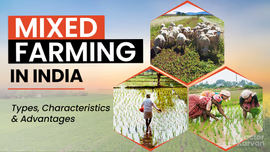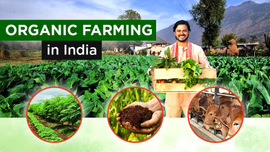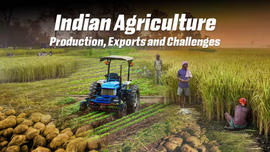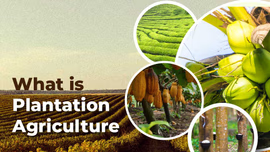What is Permaculture Farming: Its Principles, Benefits and Popular Practices

Permaculture Farming in India is becoming popular due to its sustainable approach to agriculture. It is basically the growth of the agricultural ecosystem in a self-sufficient way. If you want to start your permaculture farm, then keep on reading this blog, and learn its key principles, benefits and popular permaculture practices in India.
Table of Contents
- What is Permaculture?
- Permaculture Farming in India
- What are the Key Principles of Permaculture Farming in India?
- How to Start a Permaculture Farm?
- What are the Popular Permaculture Practices in India?
- What are the Benefits of Permaculture Farming in India?
- Institutions involved in the Promotion of Permaculture Farming
- Conclusion
What is Permaculture?
Permaculture, as a concept and movement, is derived from mixing two words, 'permanent' and 'culture.' It means a permanent culture to highlight the bigger challenges of sustainable living. It is a holistic agricultural and land management practice of creating self-sustaining ecosystems by integrating human activity with natural surroundings. It follows the natural cycle of our ecosystem to produce agricultural goods. It aims to reduce waste, promote an environmentally friendly ecosystem, and prevent pollution.
Permaculture Farming in India
Permaculture farming is the practice of working with nature to grow crops without interrupting the natural cycle of the ecosystem. In India, permaculture covers less than 0.05 million hectares of land. Now, more and more sustainable approaches are being practised mainly by farmers. The major practices under permaculture in India are horticulture, perennial and arable crops, domestic livestock management and related activities.
It works on three ethics:
- Earth Care: According to this principle, farming shouldn't alter the natural ecosystem of our earth. We should preserve our natural resources.
- People Care: This principle is all about giving people all the resources they need to live.
- Fair Share: This is all about recognizing the need to balance consumption and production to avoid resource depletion and exploitation.
What are the Key Principles of Permaculture Farming in India?
- Observe and Interact: Observe nature before making any decisions or changes. Try to observe natural patterns of the environment. This includes observation of landscape, climate, flora and fauna, etc.
- Conserve and Store Energy: Conserve all the natural resources for later use. For example, a collection of rainwater, the construction of farm ponds, and water-soaking pits for summer use.
- Obtain a Yield: Produce food, energy, and other resources from your land.
- Self-Regulation and Feedback: Try to adapt each type of feedback loop to maintain a healthy system balance.
- Renewable Resources: More and more renewable resources, like sunlight, water, and organic matter, are being used to fulfil farming needs.
- Produce No Waste: Reduce waste and find new ways to use all the existing resources.
- Design from Patterns: Use nature's patterns as templates for practical design.
- Integrate: Permaculture is all about having things support each other and work together, trying to blend different parts to make varied and useful systems.
- Small and Slow Solutions: Start slowly, as making gradual changes and working with slow systems makes permaculture systems much easier to maintain.
- Diversity: Planting various crops helps make a strong system that can better handle pests, diseases, and changes in the weather.
- Use Edges: The interface between different zones is often quite interesting. Make use of areas that might seem unproductive.
- Creatively Use and Repurpose: Never stop learning and improving your system.
How to Start a Permaculture Farm?
Understanding the local climate, water supply, access points, etc. are the key points to consider when starting a permaculture farm. Let’s understand how to start permaculture farm in more detail.
Understanding the Local Climate
The primary factor for agriculture is climate, which is responsible for every aspect of your permaculture farm. You have to consider different climate aspects before starting a permaculture farm, including temperature, wind, humidity, rainfall, isolation, etc.
Water Supply
The two primary factors determining permaculture farm development are availability of water and rainfall. Thus, it is important to store, harvest, and distribute water to develop the farm ponds and recharge groundwater. During water system development, you should ensure the storage and reticulation of water which is available for harvesting.
Defining Access Points
Once the water supply is developed, you need to build access to the paths, roads, and tracks, which act as the permanent features of the landscape and are quite necessary primarily at the start of the process. The access point locations will define your movement in and around the farm. The access point locations are influenced by the land shape, climate, and water supply developed in the previous step.
Constructing Fences
Fences can be considered infrastructure but will not be farm's permanent part as other components of infrastructure. Although they come in the later stage during the construction of a permaculture farm, if you are sure where to put them on the farm, you can go for permanent and fixed fencing.
Soil Health Improvement
Soil is the primary factor that is considered in agriculture. However, in case of permaculture, it can be considered at last because any poor soil can be made fertile easily. Thus, you need to build your soil health quickly during the development of your farm. The key methods used for soil health improvement are preventing soil erosion, mulching and using compost teas and bio-fertilizers.
Planting Crops and Trees
Once the water supply and soil are ready, you can start planting and constructing the main systems of the farms, such as woodlots, orchards, pastures, farm forestry, market gardens, and many others. In most scenarios, you need to start with making windbreaks to protect the plantations. After that, you can start planting trees, woody crops, annual crops, and perennial ones. Before tree-based plantation systems, you need to establish pastures and lands for annual plants. During tree plantation, the pattern should depend on the land shape.
Introducing Livestock
Animals are an important part of whole agriculture enterprise, and they make the ecology which is regenerative. If you want to keep the progression natural, then animals should be introduced after seeding trees. You can also introduce them along with the plants, but it adds some risk to your money. You can consider chicken and pigs for your farm because they have less maintenance and offer quick cash flow.
Developing the Economy of Permaculture Farm
Once the construction of your farm is done, you need to deal with the financial aspects and make your farm sustainable. It starts with developing personal relationships with customers who are probably visiting your farm from the neighbouring areas. You can also use simple and free marketing techniques, such as social media, to make your farm famous and make connections.
What are the Popular Permaculture Practices in India?
Agroforestry: It comes from the combination of agriculture and forestry. It is an approach to permaculture that combines trees or shrubs along with livestock or crops.
Harvesting Rainwater and Greywater: Capturing and storing rainwater and greywater for later use is a fundamental permaculture technique.
Cell Grazing: Under permaculture, cell grazing is the preferred method, which involves moving groups of livestock regularly between different fields, pastures, or forests. The disturbances caused by grazing animals can improve the ecology and allow plants to regrow more quickly when done responsibly.
Sheet Mulching: Protective covers like wood chips, cardboard, plastic, etc. are placed on top of the soil to retain water and prevent weed growth is known as sheet mulching. It helps add nutrients and organic matter to the soil, suppress weed growth, reduce erosion and evaporation, moderate temperatures, protect against frost, and absorb rainfall.
No-Till or Minimum-Till Farming: Minimum-till or no-till farming aims to leave soil undisturbed. It helps to retain soil fertility and soil moisture and reduces the amount of weed seeds.
Intercropping and Companion Planting: Intercropping is the combining of two or more plant species into an area that has beneficial effects on one another. Meanwhile, in companion planting, crops are usually grown on the basis of compatibility with each other. For example, marigold with vegetables. This helps increase plant's growth and develop resilience against pests.
What are the Benefits of Permaculture Farming in India?
- Natural resource management
- Sustainable livelihoods
- Empowering rural communities
- Savings on fertilizers
- Reduce wastage
- Cost-effective
- Enhanced soil health
Institutions involved in the Promotion of Permaculture Farming
- National Centre of Organic Farming
- Regional Centres of Organic Farming
- Deccan Development Society
- Aaranya Agriculture Alternatives
- The Indian Permaculture Network
- Ananda Permaculture Farms
Conclusion
Permaculture farming is undoubtedly a sustainable farming that has a bright future in India. It increases crop yields and decreases the risk of pests and diseases, offering sustainable solutions to farmers. By adopting permaculture practices, farmers can increase their overall agricultural productivity.
Frequently Asked Questions On What is Permaculture Farming: Its Principles, Benefits and Popular Practices
1. What is permaculture farming?
Permaculture farming is the practice of working with nature to grow crops without interrupting the natural cycle of the ecosystem.
2. Is permaculture farming a sustainable farming method?
Yes, permaculture farming is a sustainable farming method that increases crop yield and reduces waste.
3. Is permaculture profitable in India?
Yes, it is a profitable farming method due to natural resource management and reduced labour costs.
4. What is the principle of permaculture farming in India?
The principle of permaculture farming in India is to obtain a crop yield and to reduce waste.


Related Blogs












